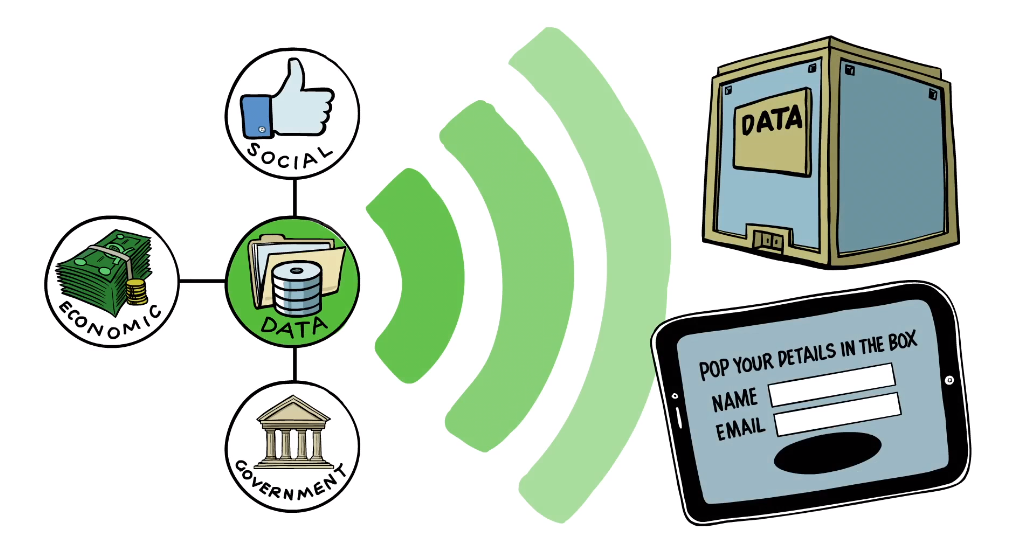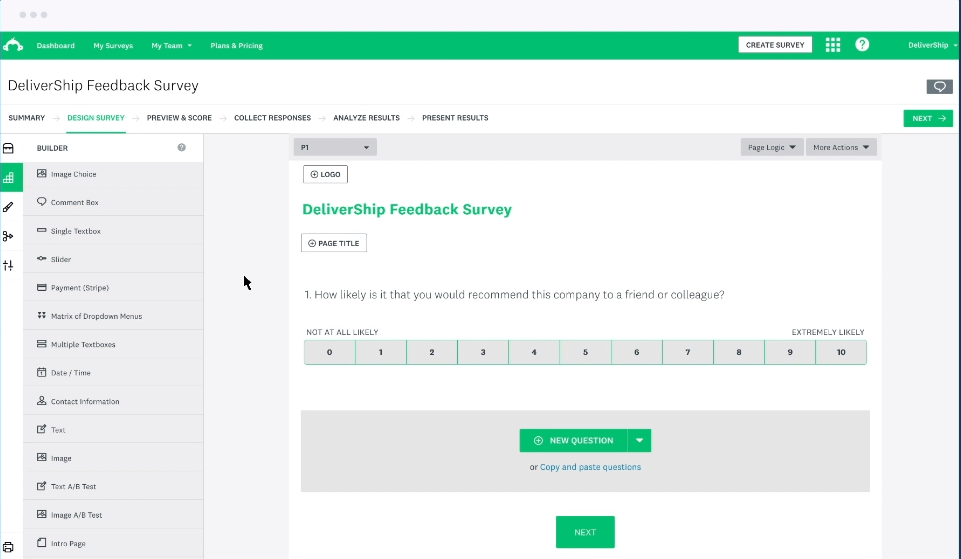Introduction
A Brief Overview Of The Increasing Reliance On Data Collection
Data collection is becoming an increasingly essential aspect of business operations in today’s digital age. Companies rely on data to gain insights into consumer behavior, improve their products and services, and make informed decisions about the direction of their businesses. This has led to an explosion in the number of tools available for collecting data, such as Survey Monkey, which makes it easier than ever before for businesses to gather information from customers.
However, this increased reliance on data collection has also raised concerns about privacy and security. As more personal information is collected by companies through surveys and other means, there is a risk that this information could be stolen or misused. Businesses must take steps to safeguard customer data through encryption and other protective measures.
The Significance Of Data Security In Modern Times

The importance of data security in modern times cannot be overstated, especially with the growing reliance on technology for data collection and storage. As more businesses and individuals turn to online platforms like Survey Monkey for surveys and feedback, it is crucial to prioritize the security of sensitive information. In an age where cybercrime is rampant, companies must take proactive measures to protect their data from unauthorized access or misuse.
Understanding Survey Monkey
An Introduction To Survey Monkey As A Popular Survey Platform

Survey Monkey is a popular online survey platform that enables users to design and conduct surveys easily. It provides various features like question types, templates, customization options, and data analysis tools to create professional-looking surveys in minutes. Survey Monkey has been widely used by businesses, organizations, educational institutions, and individuals as it offers a user-friendly interface with powerful survey-building capabilities.
The Benefits Of Using Survey Monkey For Data Collection

One of the major benefits of using Survey Monkey is its ease of use and accessibility. Respondents can easily access and complete surveys on their mobile devices or computers, which makes participation more convenient and increases response rates. Additionally, Survey Monkey provides basic analysis tools to help users make sense of their data.
Another advantage of using Survey Monkey is the ability to customize surveys according to specific needs. The platform offers various question types such as multiple-choice, open-ended, rating scales, and much more. Users can also choose from a variety of pre-made survey templates that are designed for different industries or purposes.
Survey Monkey also provides various security features to protect sensitive data from unauthorized access or disclosure. The platform uses SSL encryption for secure transmission of data between the user’s device and the server. Furthermore, Survey Monkey complies with international privacy regulations such as GDPR and CCPA to ensure that user information is handled appropriately.
The Importance of Data Security
Highlighting The Critical Need For Secure Data Handling
The need for secure data handling cannot be overstated, especially when it comes to personal information such as names, email addresses, and even financial details.
The consequences of insecure data handling can be severe and far-reaching. Cybercriminals can gain unauthorized access to sensitive information, leading to identity theft and financial fraud. Furthermore, failing to secure data can lead to legal repercussions and tarnish an organization’s reputation. Therefore, ensuring that Survey Monkey users understand the importance of secure data handling is critical.
Exploring The Potential Consequences Of Data Breaches
When a data breach occurs, sensitive information such as personal identification information (PII), credit card numbers, or even health records can be exposed. And it’s not just individuals who suffer from the repercussions of data breaches; companies also face significant losses in terms of their reputation and finances.
The potential fallout from a data breach includes identity theft, fraud, financial loss for both individuals and businesses, reputational damage to the affected organization, and legal action against the company responsible for failing to protect user data. Data breaches can also result in fines imposed by regulatory bodies that oversee privacy laws. For example, the European Union’s General Data Protection Regulation (GDPR) imposes substantial penalties on companies that fail to safeguard their users’ personal data properly.
Survey Monkey’s Security Measures
Encryption Protocols
Encryption protocols play a vital role in safeguarding sensitive data. Survey Monkey uses 256-bit SSL encryption for transmitting data between respondents and their servers, ensuring that all information communicated during surveys is secure. Additionally, Survey Monkey offers password protection for surveys to ensure that only authorized parties can access them.
Access Control and Authentication
Access control ensures that only authorized personnel have access to the sensitive information collected from the survey participants. This is achieved by using techniques such as encryption, passwords, and firewalls.
Authentication, on the other hand, involves verifying the identity of users who request access to the system or data. This can be done through various methods such as biometrics (facial recognition or fingerprint scanning), security tokens (smart cards or USB keys), or multi-factor authentication (MFA). Survey Monkey employs MFA which requires users to provide more than one form of identity verification before being granted access.
Both access control and authentication play a vital role in ensuring that confidential survey data remains secure and protected from unauthorized access. By implementing these measures effectively, Survey Monkey can maintain its reputation as a reliable platform for conducting online surveys while providing peace of mind for both researchers and respondents alike.
Compliance with Industry Standards
In terms of compliance with industry standards, Survey Monkey adheres to regulations such as GDPR (General Data Protection Regulation) and CCPA (California Consumer Privacy Act). These regulations require companies to implement specific measures to protect user data from unauthorized access or disclosure. Survey Monkey also undergoes regular audits by third-party assessors who evaluate the company’s adherence to these regulations.
Moreover, Survey Monkey provides its users with tools that enable them to comply with industry standards when collecting customer information. For instance, users can include a consent form in their surveys or anonymize responses if necessary.
Disaster Recovery and Backup Procedures
In the case of Survey Monkey, the company has implemented several measures to ensure that its customer’s data is secure and available even in the event of a disaster. The company uses multiple geographic locations to store its customers’ data, ensuring that there is always a backup copy available if one site goes down. Additionally, Survey Monkey regularly tests its disaster recovery procedures to ensure that they are effective and up-to-date.
Survey Monkey’s Privacy Policies
Exploring Survey Monkey’s Privacy Policy
The company has implemented several measures to ensure the privacy and security of its users’ data. Survey Monkey’s privacy policy states that it collects only the information necessary to provide its services and does not sell or share any personal data with third parties without explicit consent.
The company also uses encryption technology to protect data in transit and at rest, as well as two-factor authentication for account access. Survey Monkey also conducts regular security assessments and audits to identify potential vulnerabilities in their systems.
However, it’s important for users to understand their role in safeguarding their own data when using an online platform like Survey Monkey. This includes creating strong passwords, being cautious of phishing scams, and utilizing available security features such as single sign-on (SSO) integration.
How User Data Is Handled And Protected?
To safeguard user data, Survey Monkey employs various security measures such as encryption and firewalls. The platform also conducts regular security audits to ensure that its systems are up-to-date with the latest security protocols. Additionally, all employees undergo mandatory security training to uphold best practices in handling sensitive information.
Furthermore, Survey Monkey adheres to strict data protection laws such as GDPR (General Data Protection Regulation) and CCPA (California Consumer Privacy Act). These regulations provide guidelines on how companies should handle the personal information of individuals.
Evaluating Potential Vulnerabilities
External Threats
External threats are one of the most significant challenges faced by online survey platforms like Survey Monkey. These threats can come from various sources, including hackers, cybercriminals, and even state-sponsored attacks. The consequences of a successful breach could be devastating for both the platform and its users – sensitive data being exposed or stolen can result in financial losses, legal repercussions, and reputational damage.
Internal Risks
Internal risks refer to the vulnerabilities that originate from within an organization. These are risks that arise due to the actions or inactions of employees, contractors, or other individuals who have access to sensitive information. While external threats such as hackers and cybercriminals are often given more attention, internal risks pose significant dangers to organizational security.
One major internal risk is human error. Employees may accidentally delete or share confidential data without realizing it, putting the organization at risk of a data breach. Another threat is intentional malfeasance by disgruntled employees seeking to harm their employer. It’s crucial for organizations to invest in training programs that educate employees on best practices for handling sensitive information and foster a culture of security and accountability.
Comparing Survey Monkey’s Security with Competitors
When it comes to data security, Survey Monkey has not only implemented a number of security measures but also sought third-party validation. They have earned several certifications including the ISO 27001, SOC 2 Type II, and TRUSTe certifications for their privacy policies. They have also invested in encryption technologies which ensure that data is secure both during transit and when at rest.
Survey Monkey’s competitors like Qualtrics and Google Forms have also implemented several security measures such as encryption and firewalls to safeguard customer data. However, they may not have achieved the same level of third-party validation as Survey Monkey has. While all three platforms provide users with control over who can access their surveys, Survey Monkey provides an added layer of protection with its SSO feature which allows organizations to manage user access from one central location.
Customer Support and Incident Response
Investigating Survey Monkey’s Customer Support For Security Concerns
Survey Monkey’s customer support team is prompt in responding to inquiries about their security measures. They provide detailed information about the encryption methods they use to protect user data, as well as the steps they take to prevent unauthorized access to their servers. Additionally, they provide resources for further reading on their website regarding data privacy and security.
Examining Survey Monkey’s Incident Response Procedures
Survey Monkey’s incident response procedures involve several steps designed to quickly detect and respond to any potential security issues. This includes regular monitoring of system logs and network traffic for any suspicious activity. Additionally, they have established an internal team dedicated solely to responding to incidents as quickly and effectively as possible.
If an incident does occur, Survey Monkey works closely with law enforcement agencies as well as third-party cybersecurity experts to investigate the issue and implement appropriate measures. They also maintain open communication with users regarding any potential risks or impacts related to the breach.
Ethical Considerations in Data Collection
Discussing Ethical Dilemmas Associated With Data Collection
One of the most significant ethical dilemmas associated with data collection is privacy. As more and more data is collected, it becomes increasingly important to ensure that the privacy rights of individuals are protected. This includes not only collecting data that is necessary for a particular study or research project but also ensuring that any other information collected is kept confidential and secure.
Another ethical dilemma arises from the potential misuse of data. There have been numerous cases in which companies or organizations have misused data collected from surveys or other sources, leading to negative consequences for individuals or groups. To avoid these scenarios, it’s important to establish strict guidelines for how data can be used and who has access to it.
There are concerns about bias in the collection of certain types of data. For example, if a survey only collects responses from a specific demographic group, the results may not accurately reflect the opinions or experiences of other groups. To mitigate this risk, researchers must take steps to ensure that their sample sizes are representative and diverse.
Survey Monkey’s Approach To Maintaining Ethical Standards
Survey Monkey has a strong commitment to maintaining ethical standards, especially when it comes to safeguarding customer data. The company has a comprehensive approach to ensuring the security of its platform and takes every possible measure to protect user information from unauthorized access, theft, or misuse. Survey Monkey’s privacy policy is transparent and easily accessible on its website, which provides customers with detailed information about how their data is used and protected.
The company also complies with all relevant data protection regulations in the countries where it operates. Survey Monkey ensures that its employees are well-trained in handling sensitive customer data and that only authorized personnel have access to such information. Additionally, Survey Monkey has implemented various technical measures like encryption protocols, two-factor authentication, firewalls, and intrusion detection systems that help keep cyber-attacks at bay.
Conclusion
It is evident that Survey Monkey has taken significant measures to safeguard the data of its customers. The company has implemented robust security protocols that ensure data encryption during transmission and while at rest. Additionally, it provides users with tools to control access to their surveys and restrict who can view or edit them.
Despite the numerous measures that Survey Monkey has put in place, users can also take extra steps to enhance their security. For instance, using strong passwords and enabling two-factor authentication can go a long way in preventing unauthorized access to their accounts.
